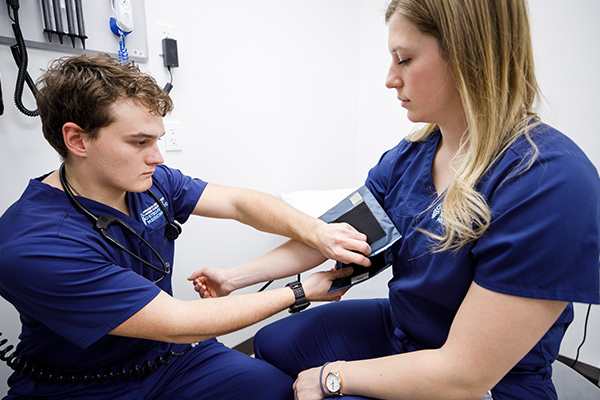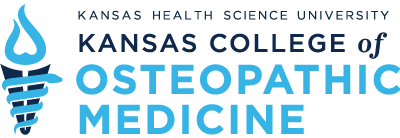Drug-Free Schools and Communities Act of 1989
The Kansas College of Osteopathic Medicine is providing the following information in compliance with the Drug-Free Schools and Communities Act of 1989 and in support of the medical school’s commitment to assist KansasCOM students and employees in engaging in safe and healthy conduct.
A. Prohibited conduct pertaining to illicit drugs and alcohol use by students and employees:
The KansasCOM prohibits the unlawful manufacture, possession, use, distribution, sale, or purchase of illicit drugs and alcohol by students and employees on medical school property, or as part of any KansasCOM activities. The sale, possession, and consumption of alcohol or cereal malt beverages is permissible only by persons of lawful age for events and locations that are specifically approved pursuant to KansasCOM policies.
Employees at KansasCOM are provided this policy as part of the new employee orientation process, which explains that a violation of the policy could result in disciplinary action up to and including dismissal.
B. Applicable legal sanctions under federal, state, and local law for the unlawful possession or distribution of illicit drugs and alcohol:
Legal sanctions under federal, state, and local law for the unlawful possession or distribution of illicit drugs and alcohol are severe. Such sanctions include substantial fines, imprisonment, loss of driving privileges, and loss of federal financial aid. There can also be severe implications for future physicians and their potential for licensing. For more specific information concerning these sanctions, visit the section of the policy on Sanctions.
C. Health risks associated with alcohol and drug use:
Alcohol consumption poses several health risks including impaired judgment, impaired coordination, and impaired attention which may lead to difficulty in safely navigating one’s environment or difficulty in safely operating a motor vehicle. Unlawful drug use poses multiple health risks that can negatively impact academic, occupational, and social functioning. For more information about health risks associated with alcohol and drug use, visit the section of this policy on Health Risks.
D. Drug or alcohol counseling and related programs that are available to students and employees:
Drug and alcohol counseling, treatment, and related programs are available through a referral by KansasCOM Counseling Services and found within the Wichita community and within the state of Kansas. For more information about substance abuse assessment screening and counseling for KansasCOM employees and students, contact Human Resources or the Office of Student Affairs. Additional information about drug or alcohol counseling is available in the section of this policy on Drug and Alcohol Counseling and Programs.
E. Imposition of disciplinary sanctions:
Any student or employee who uses, possesses, manufactures, sells, or distributes controlled substances or alcohol in violation of law on medical school property or at medical school activities will be subject to disciplinary action, in accordance with applicable policies KansasCOM, the Kansas Board of Regents, and regulations and laws of the state of Kansas. In addition to referral for prosecution, disciplinary actions by KansasCOM will include, at a minimum, the required completion of a substance abuse assessment and any recommended treatment and may include more severe sanctions up to and including suspension, dismissal, termination of employment.
Sanctions
Penalties for violations of drug and alcohol under federal law for unlawful possession of a controlled substance in violation of 21 U.S.C. §844(a), include:
First Conviction: term of imprisonment of not more than one year, a minimum fine of $1,000, or both.
Second Conviction: At least 15 days in prison but not more than two years, minimum fine of $2,500 but not more than $250,000 for an individual, or both.
After two convictions: At least 90 days in prison but not more than three years, minimum fine of $5,000 but not more than $250,000 for an individual, or both.
For more information about maximum penalties for violation of the Federal Controlled Substances Act and Related Laws, see http://www.fas.org/sgp/crs/misc/RL30722.pdf
Unlawful distribution of a controlled substance to an individual without that individual’s knowledge with the intent to commit a crime of violence, including rape is punishable by up to 20 years of imprisonment; a maximum fine of $250,000. 21 U.S.C. §841(b)(7).
Unlawful distribution of a controlled substance, possession with intent to distribute, or manufacturing a controlled substance in, on or within 1,000 feet of a public college or university is punishable by not less than one year of imprisonment and twice the maximum penalty provided by law. For second convictions, the mandatory minimum term of imprisonment is three years and three times the maximum punishment provided by law. 21 U.S.C. §860.
Penalties for drug traffickers and possessors also include loss of federal benefits, including student loans and federal financial assistance, and civil penalties up to $10,000 for each violation. 21 U.S.C. §862 and 21 U.S.C. §844a(a).
Drugs – State law penalties
Penalties under Kansas law for the unlawful possession or distribution of drugs are based on the quantity of drug, type of drug, and criminal history of the defendant. See K.S.A. 2012 Supp. 21-5706. Maximum penalties range from fines of $100,000 to $500,000 and imprisonment from 10 months to 17 years.
Alcohol-related penalties under State law
It is illegal under Kansas law and local ordinance for a person of any age to consume alcoholic liquor on public property except when permitted by Kansas Board of Regents and KansasCOM policy. A violation of this state law is punishable by a fine of not less than $50 nor more than $200, imprisonment for not more than six6 months, or both.
It is illegal under Kansas law and local ordinances for persons under 21 years of age to possess, consume, obtain, purchase or attempt to obtain alcoholic liquor or cereal malt beverages. Maximum penalties include a fine up to $500 (a mandatory minimum fine of $200 for persons 18 and 21 years of age); completion of 40 hours of public service; completion of a community-based alcohol and drug educational or training program with costs assessed to the offender; and mandatory suspension of driving privileges for 30 days for a first conviction; 90 days for a second conviction; and one year for a third or subsequent conviction.
Convictions for Driving Under the Influence (DUI) include a mandatory alcohol and drug evaluation and requirement to following any recommendation made as a result of that evaluation with costs assessed to the defendant, and additional penalties, including:
First Conviction
- A fine of not less than $750 nor more than $ 1,000, and
- Imprisonment of not less than two days nor more than six months.
- Mandatory minimum 48 consecutive hours in imprisonment
- Driving privileges suspended for 30 days, followed by a 180-day ignition interlock restriction
Second Conviction
- A fine of not less than $1,250 nor more than $1,750
- Imprisonment of not less than 90 days nor more than one year
- Mandatory minimum 120 hours imprisonment
- Driving privileges suspended for one year, followed by a one-year ignition interlock restriction
Third Conviction
- A fine of not less than $1,750 nor more than $2,500
- Imprisonment of not less than 90 days nor more than one year
- Mandatory minimum 90 days imprisonment
- Driving privileges suspended for one year, followed by a two-year ignition interlock restriction
Fourth Conviction
- A fine of not less than $2,500
- Imprisonment of not less than 90 days nor more than one year
- Mandatory minimum 90 days of imprisonment
- Driving privileges suspended for one year, followed by a three-year ignition interlock restriction (For a fifth conviction, driving privileges are suspended for one year, followed by a 10-year ignition interlock restriction)
Refusal to take a preliminary breath test is a traffic infraction usually resulting in a fine. Refusal to take the breath, blood or urine test offered at the police station for a first offense will result in suspension of driving privileges for one year, and two years required use of an ignition interlock device.
Local city ordinances for drug and alcohol offenses impose sanctions similar in severity to state law.
Health Risks
The consumption of alcohol poses several health risks including impaired judgment, impaired coordination, and impaired attention which may lead to difficulty in safely navigating one’s environment or difficulty in safely operating a motor vehicle.
Consuming alcohol may alter a person’s ability to learn or retain information, or negatively impact academic, occupational, or social functioning. At low doses, alcohol causes disinhibition and mood lability, increasing risk of inappropriate sexual acts or aggressive behavior.
Alcohol depresses the central nervous system and at high doses can cause respiratory depression and death. Repeated use of alcohol can lead to a maladaptive usage pattern referred to as alcohol dependence. Alcohol dependence is marked by increased physiological tolerance of alcohol’s effects and alcohol withdrawal upon sudden cessation of use. Alcohol withdrawal symptoms include autonomic hyperactivity such as anxiety, sweating, and tachycardia; tremors, nausea, vomiting, hallucinations, psychomotor agitation, seizures, and death. Long-term use of alcohol can cause permanent damage to vital organs, particularly to the brain and the liver.
Illicit drug use poses multiple health risks that can negatively impact academic, occupational, and social functioning. For information on specific adverse effects of a particular drug, please refer to the United States Drug Enforcement Administration list of illicit drugs and associated risks at https://www.dea.gov/factsheets.




